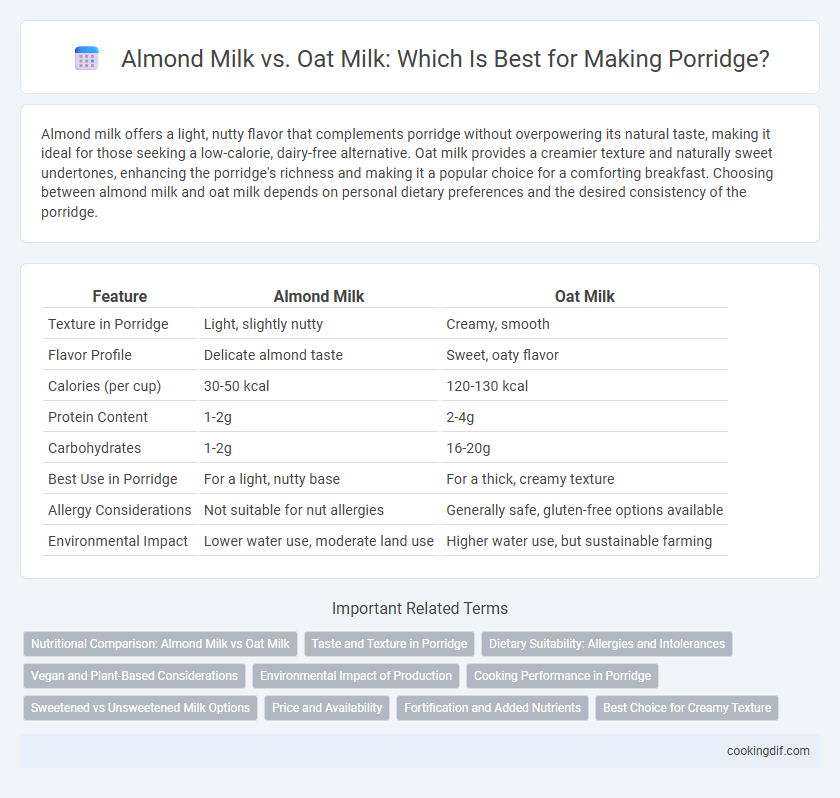Almond milk offers a light, nutty flavor that complements porridge without overpowering its natural taste, making it ideal for those seeking a low-calorie, dairy-free alternative. Oat milk provides a creamier texture and naturally sweet undertones, enhancing the porridge's richness and making it a popular choice for a comforting breakfast. Choosing between almond milk and oat milk depends on personal dietary preferences and the desired consistency of the porridge.
Table of Comparison
| Feature | Almond Milk | Oat Milk |
|---|---|---|
| Texture in Porridge | Light, slightly nutty | Creamy, smooth |
| Flavor Profile | Delicate almond taste | Sweet, oaty flavor |
| Calories (per cup) | 30-50 kcal | 120-130 kcal |
| Protein Content | 1-2g | 2-4g |
| Carbohydrates | 1-2g | 16-20g |
| Best Use in Porridge | For a light, nutty base | For a thick, creamy texture |
| Allergy Considerations | Not suitable for nut allergies | Generally safe, gluten-free options available |
| Environmental Impact | Lower water use, moderate land use | Higher water use, but sustainable farming |
Nutritional Comparison: Almond Milk vs Oat Milk
Almond milk typically contains fewer calories and less sugar compared to oat milk, making it a lighter option for porridge. Oat milk offers higher carbohydrate content and more dietary fiber, which contributes to sustained energy release and improved digestion. Both plant-based milks provide essential vitamins and minerals, but oat milk generally contains more protein and beta-glucans, beneficial for heart health.
Taste and Texture in Porridge
Almond milk creates a subtly nutty flavor and adds a light, slightly thinner texture to porridge, making it ideal for those who prefer a delicate taste. Oat milk imparts a naturally sweet, creamy richness that enhances the porridge's smoothness and body, often resulting in a more indulgent and satisfying mouthfeel. Choosing between almond and oat milk depends on whether you want a lighter, nuttier profile or a richer, creamier consistency in your porridge.
Dietary Suitability: Allergies and Intolerances
Almond milk is suitable for those avoiding gluten and soy but may trigger nut allergies, making it unsuitable for individuals with nut sensitivities. Oat milk offers a hypoallergenic alternative often safe for people with nut and soy allergies, yet it may contain gluten unless certified gluten-free, posing risks for those with celiac disease or gluten intolerance. Choosing between almond and oat milk for porridge should prioritize individual dietary restrictions related to nut allergies and gluten sensitivity to ensure safe consumption.
Vegan and Plant-Based Considerations
Almond milk offers a light, nutty flavor and lower calories, making it a popular choice among vegans seeking a dairy-free, plant-based option for porridge. Oat milk provides a creamier texture and naturally sweeter taste, enhancing porridge richness while maintaining allergen-friendly qualities important for vegan diets. Both almond and oat milk deliver essential nutrients like vitamin E and fiber, supporting plant-based nutrition in breakfast options.
Environmental Impact of Production
Almond milk production requires significantly more water compared to oat milk, with estimates showing almonds use about 1,900 gallons of water per pound, raising sustainability concerns in drought-prone regions. Oat milk has a lower carbon footprint and is generally more environmentally friendly due to its efficient land use and reduced water consumption. Choosing oat milk over almond milk for porridge supports better resource conservation and lowers overall environmental impact.
Cooking Performance in Porridge
Almond milk creates a lighter, slightly nutty texture in porridge, but its lower fat content can result in a thinner consistency and sometimes less creaminess during cooking. Oat milk, richer in natural starches and sugars, enhances the porridge's creaminess and thickness, providing a smoother and more velvety cooking performance. For porridge, oat milk generally outperforms almond milk in achieving a rich, cohesive texture without additional thickeners.
Sweetened vs Unsweetened Milk Options
Choosing between almond milk and oat milk for porridge depends on sweetness preference and nutritional goals. Sweetened almond milk can add extra sugar and calories, while unsweetened almond milk offers a lower-calorie, nutty flavor ideal for controlled sweetness. Unsweetened oat milk provides natural creaminess with minimal sugar, making it a great choice for those wanting a rich texture without added sugars.
Price and Availability
Almond milk and oat milk differ significantly in price and availability, with almond milk generally costing more due to higher production expenses and often limited supply in some regions. Oat milk tends to be more affordable, benefiting from growing popularity and widespread availability in supermarkets and online stores. Consumers seeking budget-friendly options for porridge often favor oat milk, while almond milk remains a premium choice depending on local market conditions.
Fortification and Added Nutrients
Oat milk for porridge often contains natural fiber and beta-glucans, enhancing heart health benefits and digestion. Almond milk is frequently fortified with calcium, vitamin D, and vitamin E, boosting nutritional value absent in its original form. Choosing between the two depends on desired nutrient intake, with oat milk supporting fiber enrichment and almond milk offering targeted fortification for bone and immune health.
Best Choice for Creamy Texture
Oat milk offers a naturally creamy texture that enhances the smoothness of porridge, making it an ideal choice for a rich and velvety consistency. Almond milk, while lighter and slightly nutty, tends to be thinner and can result in a less creamy porridge experience. For those seeking a luscious and thick porridge, oat milk provides superior creaminess and blends seamlessly with oats.
Almond milk vs Oat milk for porridge Infographic

 cookingdif.com
cookingdif.com